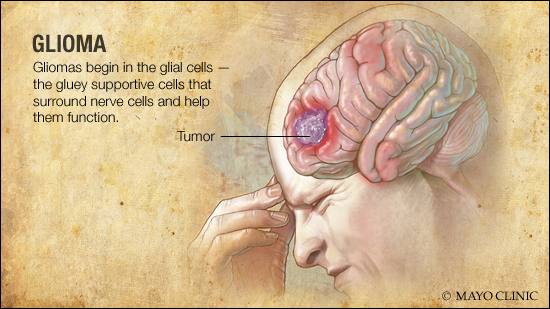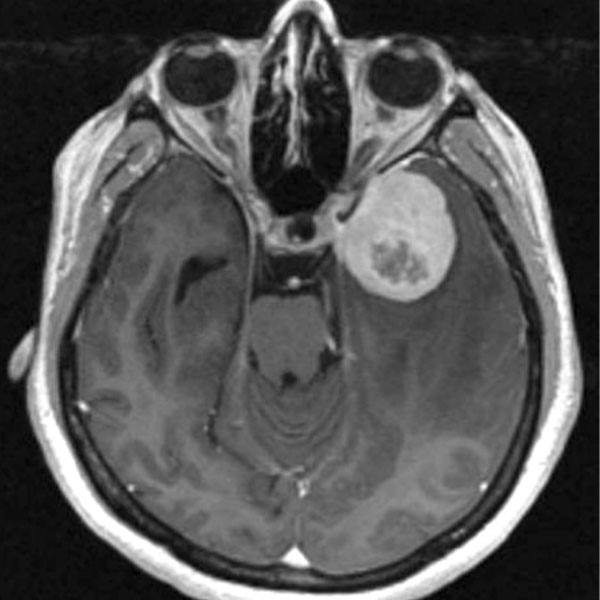-
Cancer
Research provides critical information about the size and growth speed of gliomas

ROCHESTER, Minn. — An important new clue for preventing and treating brain tumors known as gliomas has been identified in research led by the Lunenfeld-Tannenbaum Research Institute (LTRI) at Mount Sinai Hospital in Toronto and Mayo Clinic Comprehensive Cancer Center and Mayo Clinic Center for Individualized Medicine. The study, published in the journal Science, provides a rare window into the biological changes behind glioma development.
Researchers found that animal models who carry a change in DNA known as germline alteration rs55705857 developed gliomas much more frequently — and in half the time — compared to animal models without the alteration. In addition to brain tumors, the findings are relevant to other cancers and diseases.
"While we understand much of the biologic function of germline alterations within genes that code for proteins, we know very little about the biologic function of germline alterations outside of genes that code for proteins. In some way, these germline alterations interact with other mutations in cells to accelerate tumor formation," says co-lead author Robert Jenkins, M.D., Ph.D., a genetics researcher at Mayo Clinic in Rochester. "Based on this new understanding of its mechanism of action, future research may lead to novel and specific therapies that target the rs55705857 alteration."
The study offers new knowledge that may help clinicians determine, pre-surgery, whether a patient has a glioma.
"We expected that rs55705857 would accelerate low-grade glioma development, but we were surprised by the magnitude of that acceleration," says co-lead author Daniel Schramek, Ph.D., a researcher at Lunenfeld-Tannenbaum Research Institute.
There are many alterations, likely thousands, outside of genes associated with the development of cancer and other diseases, but the mechanism of action is only understood for very few, Dr. Schramek says.
This study demonstrates that, with the tools of modern molecular/cell biology, it is possible to decipher much of the mechanism of action of such alterations.
Dr. Jenkins is a Ting Tsung and Wei Fong Chao Professor in Individualized Medicine Research and researcher in Mayo Clinic’s Department of Laboratory Medicine and Pathology.
Dr. Schramek is a senior investigator and holds a Kierans & Janigan Research Chair at the LTRI and is an associate professor, Department of Molecular Genetics, Faculty of Medicine, University of Toronto.
###
About Mayo Clinic Comprehensive Cancer Center
Designated as a comprehensive cancer center by the National Cancer Institute, Mayo Clinic Comprehensive Cancer Center is defining new boundaries in possibility, focusing on patient-centered care, developing novel treatments, training future generations of cancer experts, and bringing cancer research to communities. At Mayo Clinic Comprehensive Cancer Center, a culture of innovation and collaboration is driving research breakthroughs that are changing approaches to cancer prevention, screening and treatment, and improving the lives of cancer survivors. Visit the Mayo Clinic Comprehensive Cancer Center Blog for news, information and stories from Mayo Clinic’s cancer experts and patients.
About Mayo Clinic
Mayo Clinic is a nonprofit organization committed to innovation in clinical practice, education and research, and providing compassion, expertise and answers to everyone who needs healing. Visit the Mayo Clinic News Network for additional Mayo Clinic news.
About the Lunenfeld-Tanenbaum Research Institute
The Lunenfeld-Tanenbaum Research Institute (LTRI), part of Sinai Health, is a leading biomedical research centre, ranking amongst the top biomedical research institutes in the world. Established in 1985, the institute is profoundly advancing understanding of human biology in health and disease. Many of the breakthroughs that began as fundamental research have resulted in new and better ways to prevent, diagnose and treat prevalent conditions. The institute is affiliated with the University of Toronto and is focused on women’s and infants’ health, cancer biology, stem cell biology and regenerative medicine, neurobiology, diabetes, arthritis, health systems research, population health services and solutions, and systems biology. www.lunenfeld.ca.
Media contacts:
- Kelley Luckstein, Mayo Clinic Communications Department, newsbureau@mayo.edu
- Jennifer Specht, Sinai Health Communications Department, jennifer.specht@sinaihealth.ca







